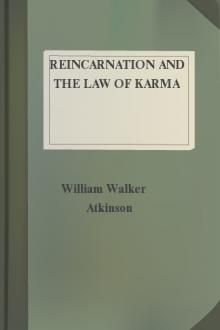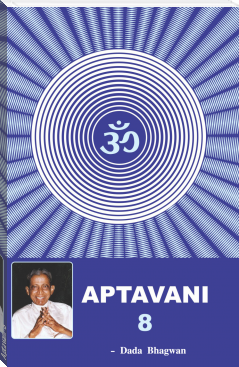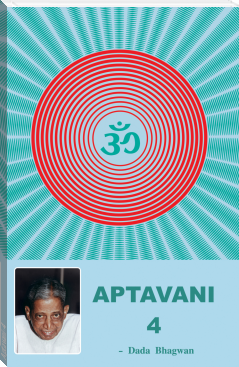Reincarnation and the Law of Karma - William Walker Atkinson (pocket ebook reader .txt) 📗

- Author: William Walker Atkinson
- Performer: -
Book online «Reincarnation and the Law of Karma - William Walker Atkinson (pocket ebook reader .txt) 📗». Author William Walker Atkinson
The orthodox theology answers Figuier's question by the argument that "in our finite understanding, we cannot pretend to understand God's plans, purposes and designs, nor to criticize his form of justice." It holds that we must look beyond that mortal life for the evidence of God's love, and not attempt to judge it according to what we see here on earth of men's miseries and inequalities. It holds that the suffering and misery come to us as an inheritance from Adam, and as a result of the sins of our first parents; but that if we are "good" it will all be evened up and recompensed in the next world. Of course the extremists who hold to Predestination have held that some were happy and some miserable, simply because God in the exercise of His will had elected and predestined them to those conditions, but it would scarcely be fair to quote this as the position of current theology, because the tendency of modern theological thought is away from that conception. We mention it merely as showing what some have thought of the subject. Others have sought refuge in the idea that we suffer for the sins of our parents, according to the old doctrine that "the sins of the parents shall be visited upon the children," but even this is not in accordance with man's highest idea of justice and love.
Passing on to the second view, namely that the soul was pre-existent, that is, existed in some higher state not understood by us, from whence it was thrust into human form, etc., we note that the questions as to the cause of inequality, misery, etc., considered a moment ago, are still actively with us—this view does not straighten out the question at all. For whether the soul was pre-existent in a higher state, or whether it was freshly created, the fact remains that as souls they must be equal in the sense of being made by the same process, and from the same material, and that up to the point of their embodiment they had not sinned or merited any reward or punishment, nor had they earned anything one way or another. And yet, according to the theory, these equally innocent and inexperienced souls are born, some being thrust into the bodies of children to be born in environments conducive to advancement, development, etc., and gifted with natural advantages, while others are thrust into bodies of children to be born into the most wretched environments and surroundings, and devoid of many natural advantages—not to speak of the crippled, deformed, and pain-ridden ones in all walks of life. There is no more explanation of the problem in this view than there was in the first mentioned one.
Passing on to the third view, namely, that the soul is one of countless others which emanated from the Source of Being æons ago, equal in power, opportunities, etc., and which individual soul has worked its way up to its present position through many rebirths and lives, in which it has gained many experiences and lessons, which determine its present condition, and which in turn will profit by the experiences and lessons of the present life by which the next stage of its life will be determined—we find what many have considered to be the only logical and possible explanation of the problem of life's inequalities, providing there is an "answer" at all, and that there is any such thing as a "soul," and a loving, just God. Figuier, the French writer, from whom we quoted that remarkable passage breathing the pessimism of the old view of life, a few moments ago, admitted that in rebirth was to be found a just explanation of the matter. He says: "If, on the contrary, we admit the plurality of human existences and reincarnation—that is, the passage of the same soul through several bodies—all this is made wonderfully clear. Our presence on such or such a part of the earth is no longer the effect of a caprice of Fate, or the result of chance; it is merely a station in the long journey that we make through the world. Before our birth, we have already lived, and this life is the sequel and result of previous ones. We have a soul that we must purify, improve and ennoble during our stay upon earth; or having already completed an imperfect and wicked life, we are compelled to begin a new one, and thus strive to rise to the level of those who have passed on to higher planes."
The advocates of Reincarnation point out that the idea of Justice is fully carried out in that view of life, inasmuch as what we are is determined by what we have been; and what we shall be is determined by what we are now; and that we are constantly urged on by the pressure of the unfolding spirit, and attracted upward by the Divine One. Under this conception there is no such thing as Chance—all is according to Law. As an ancient Grecian philosopher once said: "Without the doctrine of metempsychosis, it is not possible to justify the ways of God," and many other philosophers and theologians have followed him in this thought. If we enjoy, we have earned it; if we suffer, we have earned it; in both cases through our own endeavors and efforts, and not by "chance," nor by reason of the merits or demerits of our forefathers, nor because of "predestination" nor "election" to that fate. If this be true, then one is given the understanding to stoically bear the pains and miseries of this life without cursing Fate or imputing injustice to the Divine. And likewise he is given an incentive toward making the best of his opportunities now, in order to pass on to higher and more satisfactory conditions in future lives. Reincarnationists claim that rewards and punishments are properly awarded only on the plane in which the deed, good or bad, was committed, "else their nature is changed, their effects impaired, and their collateral bearings lost." A writer on the subject has pointed out this fact in the following words: "Physical outrage has to be checked by the infliction of physical pain, and not merely by the arousing of internal regret. Honest lives find appropriate consequence in visible honor. But one career is too short for the precise balancing of accounts, and many are needed that every good or evil done in each may be requited on the earth where it took place." In reference to this mention of rewards and penalties, we would say that very many advanced Reincarnationists do not regard the conditions of life as "rewards and punishments," but, on the contrary, look upon them as forming part of the Lessons in the Kindergarten of Life, to be learned and profited by in future lives. We shall speak of this further in our consideration of the question of "Karma"—the difference is vital, and should be closely observed in considering the subject.
Before we pass from the consideration of the question of Justice, as exemplified by Reincarnation, we would call your attention to the difference in the views of life and its rewards and punishments held by the orthodox theologians and the Reincarnationists, respectively. On the one hand, the orthodox theologians hold that for the deeds, good or evil, performed by a man during his short lifetime of a few years, and then performed under conditions arbitrarily imposed upon him at birth by his Creator, man is rewarded or punished by an eternity of happiness or misery—heaven or hell. Perhaps the man has lived but one or two years of reasonable understanding—or full three-score and ten—and has violated certain moral, ethical or even religious laws, perhaps only to the extent of refusing to believe something that his reason absolutely refused to accept—for this he is doomed to an everlasting sojourn in a place of pain, misery or punishment, or a state equivalent thereto. Or, on the other hand, he has done the things that he ought to have done, and left undone the things that he ought not to have done—even though this doing and not-doing was made very easy for him by reason of his environment and surroundings—and to crown his beautiful life he had accepted the orthodox creeds and beliefs of his fathers, as a matter of course—then this man is rewarded by an eternity of bliss, happiness and joy—without end. Try to think of what ETERNITY means—think of the æons upon æons of time, on and on, and on, forever—and the poor sinner is suffering exquisite torture all that time, and in all time to come, without limit, respite, without mercy! And all the same time, the "good" man is enjoying his blissful state, without limit, or end, or satiety! And the time of probation, during which the two worked out their future fate, was as a grain of sand as compared with the countless universes in space in all eternity—a relation which reduces the span of man's lifetime to almost absolutely NOTHING, mathematically considered. Think of this—is this Justice?
And on the other hand, from the point of view of the Reincarnationist, is not the measure of cause and effect more equitably adjusted, even if we regard it as a matter of "reward and punishment"—a crude view by the way—when we see that every infraction of the law is followed by a corresponding effect, and an adherence to the law by a proportionate effect. Does not the "punishment fit the crime" better in this case—the rewards also. And looking at it from a reasonable point of view, devoid from theological bias, which plan seems to be the best exemplification of Justice and Natural Law, not to speak of the higher Divine Justice and Cosmic Law? Of course, we are not urging these ideas as "proofs" of Reincarnation, for strictly speaking "proof" must lie outside of speculation of "what ought to be"—proof belongs to the region of "what is" and "facts in experience." But, nevertheless, while one is considering the matter, it should be viewed from every possible aspect, in order to see "how it works out."
It is also urged along the lines of the Justice of Reincarnation, as opposed to the injustice of the contrary doctrine, that there are many cases of little infants who have only a few days, or minutes, of this life, before they pass out of the body in death. According to the anti-reincarnation doctrine, these little souls have been freshly created, and placed into physical bodies, and then without having had to taste of the experiences of life, are ushered into the higher planes, there to pass an eternal existence—while other souls have to live out their long lives of earth in order to reach the same higher states, and then, according to the prevailing doctrine, even then they may have earned eternal punishment instead of eternal bliss. According to this idea the happiest fate would be for all to die as infants (providing we were baptized, some good souls would add), and the death of an infant should be the occasion for the greatest rejoicing on the part of those who love it. But in spite of the doctrine, human nature does not so act. According to the doctrine of Reincarnation, the little babe's soul was but pursuing the same path as the rest of the race—it had its past, as well as its future, according to Law and Justice. While, if the ordinary view be correct, no one would begrudge the





Comments (0)